By Chris Bumbaca
It’s an early morning at the end of May 2014 and 28 University of Wisconsin-Madison students board a bus about to embark on a four-day journey across the state of Wisconsin.
These students aren’t doing it for the chance to do some sightseeing in the Badger State. They sacrificed four days of their summer vacation to discover the Wisconsin Idea firsthand and their university’s commitment to impacting the state.
Or so they thought.
In addition to broadening their knowledge of UW-Madison’s statewide impacts, the students also experienced a “reverse-Wisconsin Idea” effect: using the leadership and collaboration skills honed and bonds formed on the trip to strengthen their efforts back on campus.
Up until the 2014 trip, the bus tour was only available to university faculty and staff members. These students were making history.
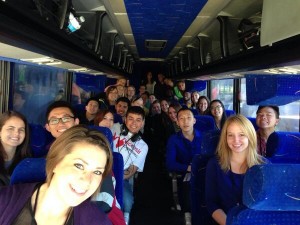
Kate Bradley, a UW-Madison senior, was one of the 28 on the bus tour.
“The experiences and the leadership opportunities that we had on the trip influenced our time on campus, kind of like a reverse-Wisconsin idea,” Bradley said. “The sites were able to impact us as student leaders and in turn, we brought that back to our student organizations.”
Bradley said she and other student leaders across campus had been encouraged to apply for the bus trip for this reason: to make sure the Wisconsin idea is alive and well in its birthplace.
As Homecoming Committee president, Bradley implemented what she learned over those five days into her planning of 2014’s events. She said collaboration is something she learned on the trip and began implementing in her student organization. This past year, she decided to partner with the Wisconsin men’s basketball team and its “Shooting Down Cancer” night, by holding the fundraising effort during Homecoming Week to help with promotion.
Despite what she brought back to campus, Bradley, an out-of-state student from Arizona, had essentially no understanding of the Wisconsin Idea before she arrived in Madison, and the trip opened her eyes to the true meaning of it, she said.
A news release from the university said one of the primary goals of the trip was to allow students “develop their leadership potential.”
Lori Berquam, Dean of Students at UW-Madison, who led the undergraduates on the trip said in the release “If we can empower these student leaders to learn about the state and the principles of the Wisconsin Idea, they will have a solid foundation and work better together when they return to campus.”
Bradley said trip she learned the importance of collaboration at the Trout Lake Research Center, where the lake relies on research efforts from the university to eliminate species that pose a threat to the natural ecosystem.
“It really was a direct way to see across the state, connected in every corner, where not only collaborating with the university but also benefiting with the work that is conducted here,” Bradley said.
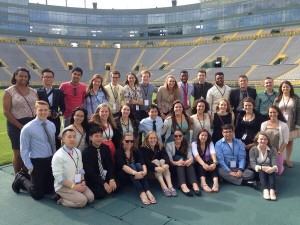
The trip recruiting already-established leaders on the UW-Madison campus comes as little surprise to Nick Hillman, a professor in the university’s Educational Leadership and Policy Analysis department, especially since it was the year students first went on bus trip.
“I think the university went after these students because they already have a track record of being leaders and following through,” Hillman said. “As the program continues, I think we’ll see it expand to more and more students.”
Bradley and the group visited five sites during the trip, which included events such as a volunteering effort in Wauzeka with the Mississippi Valley Conservancy Organization, dinner with the Parent Network on Education at the Lac du Flambeau Reservation, volunteering at the Shawano School District, a lunch with Shawano Mayor Lorna Marquardt, a tour of Lambeau Field meeting with Wisconsin alumni from the Fox River Valley, a tour of Pagel’s Ponderosa Dairy in Kewaunee, and finally, a lunch meeting with George Kerwin, CEO of Bellin Health in Green Bay.
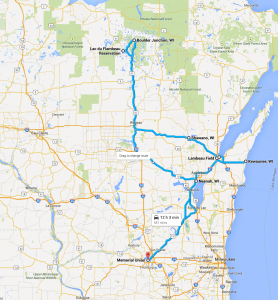
More than 11 months later, Chase Pagel, of Pagel’s Ponderosa Dairy, specifically remembered giving the group a tour. She said it was a standard tour, but included a group of students who had never been to a farm before.
Pagel also said the group had a conversation with the owner of the farm, John Pagel, to gain the perspective of the challenges facing the agriculture industry.
“It was very nice to see a group of interested students learning things about the state,” Pagel said. “[The farm] likes to have groups like that come through because it’s more of a learning experience than just a tour.”
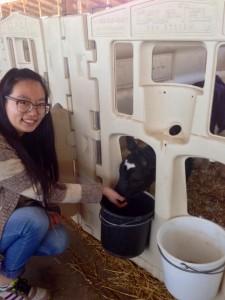
There was no talk explicitly about the Wisconsin Idea, Pagel said. She has not heard from anyone who went on the tour since the day they visited the farm. An agricultural journal and the university’s flag are the lone reminders of the visit.
While this could be seen as an abandonment from the inherent definition of the Wisconsin Idea, Peter Goff, also of the Educational Leadership and Policy Analysis at UW-Madison, said a common misconception is that leadership influences the Wisconsin Idea. Instead, he said, it should be the other way around.
“There’s a sense of shared-value that what we do at the university should be embedded in the state and relevant to what’s happening in the state,” Goff said. “With that said, the strongest connection to leadership then is the students coming through Wisconsin becoming leaders in the community, I would hope that the Wisconsin Idea cultivates a sense of shared belonging, a sense of shared mission — that we’re in it together.”
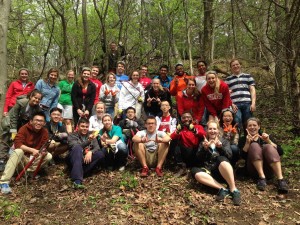
Goff, who went on the Wisconsin Idea Bus Seminar for faculty members in 2013, said Bradley’s “reverse-Wisconsin Idea” comment resonated with him, saying “I 100% agree with that,” and has positive implications for his work.
“The university is legitimately committed to this idea,” Goff said. “It has huge meanings to me as a faculty member and my research.”
For example, the university’s commitment to the Wisconsin Idea is an incentive for Goff to conduct his research initiatives in the surrounding community near Madison, talking to local superintendents and school leaders, he said.
By exposing students to the works across the state of people affected by the Wisconsin Idea, they’ve still accomplished a key goal at the Wisconsin Idea’s core by creating an impact beyond the classroom — not from the far corners of the state, but right here on campus.
For a by-the-numbers viewpoint, click here.
For information on the Wisconsin Idea Seminar, click here.
